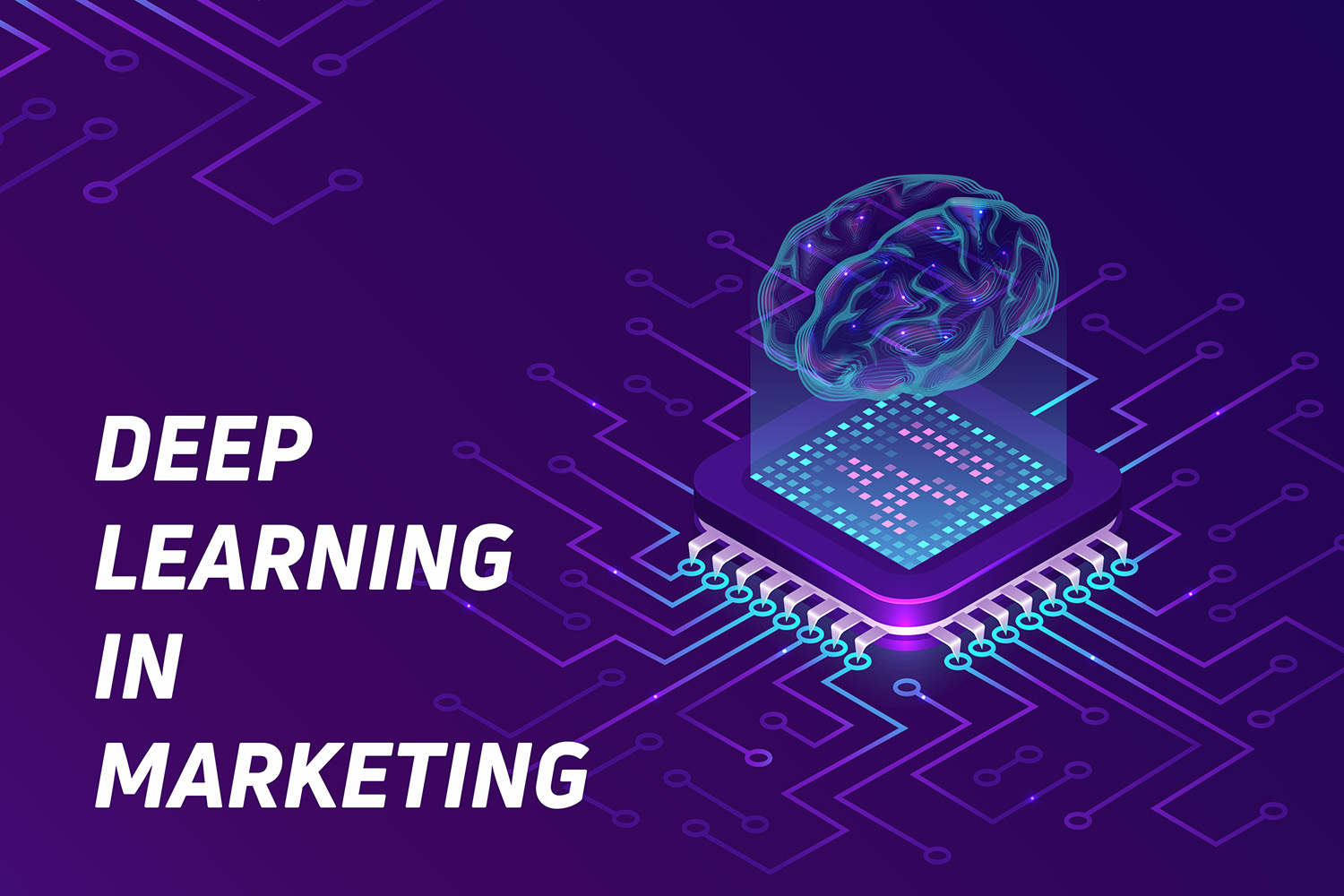Deep Learning in Marketing – The Future of Winning Marketing Campaigns
Deep learning, also known as machine learning or artificial intelligence (AI), has undergone a massive reputational shift in recent years. Once the stuff of nightmares and Hollywood horror films, it is now an incredibly useful tool that we rely on in our everyday lives. In fact, deep learning in marketing is one of the most efficient and effective weapons in your arsenal, provided you know how to use it correctly. Such is its power, it’s rapidly becoming the foundation of the future of marketing, but are you clued up on it?

What is deep learning?
Firstly, we need to clearly understand what is meant by the phrase deep learning. In a nutshell, deep learning is a branch of artificial intelligence, going one step further than standard machine learning. Deep learning sets out to think like a human and mimic the behaviour of a human, based on repeatedly doing the same thing. So, in the same way you might find a solution to a problem by trial and error, a deep learning machine can do the same.
Why bother teaching a machine to do a job when you could just do it yourself? Well, deep learning machines are built to process vast amounts of data and complete tasks at a faster rate than a human. Robots don’t need breaks or sleep, but humans do. Plus, robots don’t have ‘off’ days, when they have brain fog, but humans do. With this in mind, deep learning aims to bridge the gap and process more complex data, faster.

Not sure what your marketing metrics mean?
What does deep learning in marketing look like?
You might be wondering what exactly deep learning has to offer marketing. After all, isn’t it a creative industry? We can’t expect robots to create viral content based on human experiences because they simply don’t exist in society as conscious beings, and therefore are devoid of any and all pop culture references. AI is just for maths and science, right? Well, no. Although large parts of marketing are creative, the creatives are driven by data.
“All facets of digital marketing are driven by data collection and analysis. Information tells us what consumers are doing, how they behave, what they want, and how to deliver better results to them. The complexity of this data can range from broad overviews to incredibly intricate insights. There are layers upon layers of data to be gathered, absorbed and used for business development, each of which can be altered to provide different insights simply by adding new verticals or attributes.
“For example, we might know users visit more on certain days, but does that vary by location or perhaps time of day? And does that in turn impact engagement, or sales, or newsletter sign ups, or cart abandonments? Sometimes, these seemingly infinite levels of detail are too much for us as marketers to realistically manage, identify and deploy effectively within our campaigns.
“AI programs, by contrast, are able to make quick work of such mountains of data that would take hours or days to analyse, delivering rich, meaningful information on demand. Whereas once the needle had to be found by hand, now deep learning can detect it within moments and deliver it to you on a silver platter.”
- James Speyer, SEO Lead at The Brains
Deep learning is already present in a lot of different aspects of marketing. As a marketer, your main goal is to ensure your users feel valued and understood by presenting relevant information to them. In an increasingly commercial world, people want to have a unique experience, and that means analysing data and figuring out ways to personalise a universal experience. Humans are limited on the amount of data they can process, but machines aren’t, and this is where the future of AI in marketing is likely to be.
At the moment, deep learning is being used to observe user behaviour and predict their next move (Google Analytics is a prime example of this), which assists marketers in campaign creation and improving the customer journey, but this isn’t all.
Subscribe to our free monthly newsletter.
How is deep learning being used and what’s the future like?
So, how does deep learning integrate into marketing right now? At a basic level, machine learning can help with:
- Chatbots on your website
As a business, you need to do everything you can to give your users all the information they need to make informed buying decisions. That being said, people will always have questions, and people will always have issues, too. No one wants to wait hours or days for a response from a customer service representative, and nor do they want to directly communicate with a person if they can be more easily pointed in the direction of the resource they’re looking for. This is where chatbots come in.
Using natural language processing (NLP), chatbots can learn to interact with users in a more human way. Lots of online retailers use chatbots as a first port of call for customer queries, and a lot of the time, they’re effective. If you’re an online retailer and often deal with questions about return policies, delivery times, and the like, implementing a chatbot that uses deep learning could save you time answering questions and make things easier for your users, too.
- Harness user data to ensure a unique customer experience
As mentioned, a unique customer experience is at the forefront of a lot of users’ minds. Statistically speaking, emails that are personalised have a 6x higher transaction rate than generic emails (Marketing Land), highlighting how important it is to make your customers feel unique. Though it’s not fully-fledged just yet, deep marketing is learning how to engage hyper-personalisation within marketing, and this is one of things you should be keeping an eye out for eagerly in the coming months and years.
- Generate content ideas and topics
Content is a core part of marketing as a whole and is a key driver of organic traffic which, for now, is trumping paid traffic. The trouble is, when you’re close to a topic and live and breathe it, it can be difficult to come up with fresh ideas. Sure, having a dynamic content team will help, but deep learning can help, too. We’re already seeing it employed on platforms like Semrush where you can generate content topics and ideas using AI.
- Ad bidding
Real time bidding (RTB) is a core facet of digital marketing and advertising, giving you the ability to gain user insight, exact precision pricing, and improve your sales strategy. Ads are largely data driven, and this is where deep learning comes in. AI is employed in RTB to automate the transactional process of buying and placing ads. If you have a paid advertising strategy, you’re probably relying on deep learning without even realising it.
- Image captions
Accessibility is at the forefront of marketing and consumerism right now (as it should be), but a lot of businesses still aren’t equipped to provide additional services and information on the content they put out. Image captions are a prime example of this. Deep learning can analyse images and the data you give it to automatically provide image captions, helping to make your content more accessible.
- Voice search/speech recognition
More and more people are starting to use voice search. How many times a day do you ask Alexa or Siri a question? In order to get an answer to that question, deep learning was involved. Machines were taught how to recognise phrases and identify relevant answers, all so our lives can be made easier. As a marketer, your job is the same – to make lives easier – and that’s why integrating voice recognition into your services could prove to be a winning ticket.
- Language translation
Following on from the accessibility point, a lot more businesses are going global, but they don’t have the resources to have several international offices. If your services and products are being offered in countries with languages different from your own, you need to make sure your content is available in that language. Translators are an option, but deep learning AI can also be used.
These are just seven of the ways deep learning is already being used in marketing. If you’re not already familiar with them, try to implement a couple into your strategy. The job of deep learning is to make your life that little bit easier, so why not allow it to do so? If anything, we’re staring down the barrel of deep learning becoming more integrated into marketing as a whole, so early adoption is a good way to wrap your head around it for the benefit of your users.
Final thoughts
Robots won’t ever completely take over from humans, but where SEO is concerned, we’re likely to see an increased shift towards a reliance on deep learning and AI. Whether you’re ready or not, the robots are coming!
In the meantime, if you don’t want to go down the AI route just yet, but you need some help with your marketing campaign, we can help. Like deep learning, our Brains are here to make your life easier, whether it’s through PPC or web development.
Related Services
Who we are
The Brains is an award-winning digital marketing agency, consultancy and training provider in London.
Our Brains are experts in their field, helping companies grow faster, generate leads and overtake competitors.
What we do
Our Brains can help you with everything from ongoing marketing to training up your internal teams.
Give us a call to discuss your needs.

